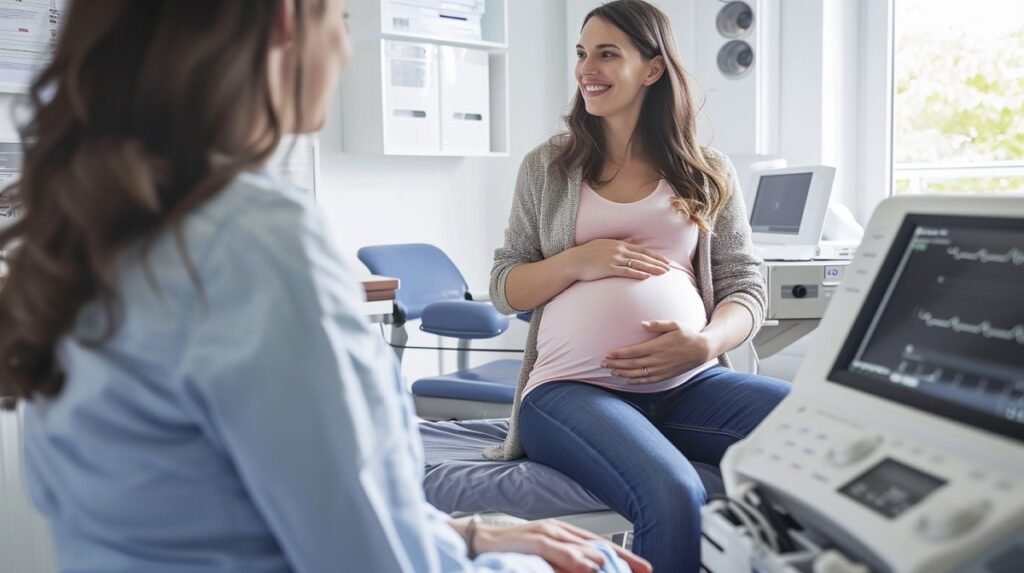An ectopic pregnancy occurs when a fertilized egg implants itself outside the uterus, most often in the fallopian tube. The fallopian tube is not designed to support a growing embryo, leading to potential bleeding in the pregnant person. This is a serious condition that requires immediate medical attention.
During a typical pregnancy, a fertilized egg travels to the uterus where it attaches and begins to grow. However, in an ectopic pregnancy, the fertilized egg does not reach the uterus. Instead, it may implant in the fallopian tube, the abdominal cavity, or the cervix.
While a pregnancy test can confirm pregnancy, it cannot determine the location of the embryo. A fertilized egg can only develop properly in the uterus. According to the American Academy of Family Physicians (AAFP), ectopic pregnancies occur in approximately 1 out of every 50 pregnancies (20 out of 1,000).
If an ectopic pregnancy is not treated, it can become a medical emergency. Immediate treatment is crucial to minimize the risk of complications, improve the chances of having healthy pregnancies in the future, and prevent long-term health issues.

What causes an ectopic pregnancy?
Sometimes the reason of an ectopic pregnancy is unclear. In some cases, the following Several conditions have been associated with an increased risk of ectopic pregnancy, including:
- Inflammation and Scarring: Previous medical conditions, infections, or surgeries can cause inflammation and scarring in the fallopian tubes.
- Hormonal Factors: Imbalances or changes in hormone levels can contribute to the likelihood of an ectopic pregnancy.
- Genetic Abnormalities: Genetic issues can play a role in abnormal embryo implantation.
- Birth Defects: Congenital anomalies in the reproductive organs may affect where an embryo implants.
- Medical Conditions: Certain health conditions can alter the shape and functionality of the fallopian tubes and other reproductive organs.
For more personalized information about your situation, your doctor can provide detailed guidance and insights.
Who is at risk for an ectopic pregnancy?
All sexually active women face some risk of ectopic pregnancy. Nonetheless, a few things may make this risk higher:
- Age: Women aged 35 or older.
- Surgical History: Previous pelvic or abdominal surgeries, or multiple abortions.
- Infections: History of pelvic inflammatory disease (PID) or sexually transmitted diseases (STDs) such as gonorrhea or chlamydia.
- Medical Conditions: History of endometriosis.
- Contraceptive Failures: Pregnancy despite using tubal ligation or an intrauterine device (IUD).
- Fertility Treatments: Use of fertility drugs or undergoing fertility procedures.
- Lifestyle: Smoking.
- Past Ectopic Pregnancy: Possessing a history of ectopic pregnancy.
- Structural Abnormalities: Physical irregularities in the fallopian tubes that impede the egg’s travel.
Talk to your doctor about any risk factors that may apply to you.Together, you can work to minimize the risk of future ectopic pregnancies.
An ectopic pregnancy is a serious medical emergency. Only the uterus can safely support a growing fetus by expanding as the fetus develops. The fallopian tubes are not capable of such flexibility and can rupture if a fertilized egg implants there, leading to severe and potentially life-threatening internal bleeding. Immediate treatment is essential to prevent damage to the fallopian tubes and other organs, and to avoid severe complications or death.
Symptoms of an ectopic pregnancy?
Nausea and breast tenderness are common symptoms in both ectopic and normal pregnancies. However, certain symptoms are more indicative of an ectopic pregnancy and can signal a medical emergency:
- Sharp Pain: Sudden, intense pain in the abdomen, pelvis, shoulder, or neck.
- Localized Pain: Severe pain occurring on one side of the abdomen.
- Vaginal Bleeding: This refers to mild to severe vaginal bleeding.
- Dizziness or Fainting: Feeling lightheaded or faint.
- Rectal Pressure: A sensation of pressure in the rectal area.
If you are pregnant and experience any of these symptoms, contact your doctor or seek immediate medical attention.
Diagnosing an ectopic pregnancy
If you think you might have an ectopic pregnancy, it is crucial to see your doctor immediately. Ectopic pregnancies cannot be diagnosed through a physical exam alone, although your doctor may perform one to eliminate other possible causes.
Diagnosis often involves a transvaginal ultrasound, where a wand-like instrument is inserted into the vagina to check for the presence of a gestational sac in the uterus.
Readmore – 10 Early Signs And Symptoms Of Pregnancy
Additionally, your doctor may conduct a blood test to measure levels of hCG and progesterone, hormones that are present during pregnancy. If these hormone levels do not increase as expected or if they decrease over a few days, and no gestational sac is visible on the ultrasound, an ectopic pregnancy is likely.
In cases of severe symptoms such as intense pain or heavy bleeding, there may not be time to complete all these diagnostic steps. If the fallopian tube ruptures, it can cause severe internal bleeding, necessitating emergency surgery to provide immediate treatment.
Treating ectopic pregnancy
Ectopic pregnancies pose serious risks to the mother’s health and are not viable for the embryo, which cannot develop to full term. Prompt removal of the embryo is crucial to protect the mother’s immediate health and preserve her long-term fertility. Treatment options depend on the ectopic pregnancy’s location and stage of development.
Medication
If your doctor determines that immediate complications are unlikely, they might prescribe medications to prevent the ectopic mass from rupturing. One common medication for this is methotrexate (Rheumatrex), as recommended by the American Academy of Family Physicians (AAFP).
Methotrexate works by stopping the growth of rapidly dividing cells, such as those in the ectopic mass. It is administered as an injection. Following the injection, you will need regular blood tests to monitor the medication’s effectiveness. If the treatment is successful, you will experience symptoms similar to a miscarriage, such as:
- Cramping
- Bleeding
- Passing of tissue
Surgery is rarely necessary after this treatment. Methotrexate does not carry the same risks of fallopian tube damage that are associated with surgery. However, you will need to avoid becoming pregnant for several months after taking this medication.
Surgery
Many surgeons recommend removing the embryo and repairing any internal damage through a procedure called a laparotomy. In this procedure, your doctor will make a small incision and insert a tiny camera to get a clear view of the area. The surgeon will then remove the embryo and fix any damage to the fallopian tube.
If the initial surgery is not successful, the surgeon may need to perform another laparotomy using a larger incision. In some cases, if the fallopian tube is severely damaged, it may need to be removed during the surgery.
Care At Home
Your doctor will provide detailed instructions for caring for your incisions after surgery. The main objectives are to keep the incisions clean and dry as they heal. Monitor the incisions daily for signs of infection, which could include:
- Persistent bleeding
- Excessive bleeding
- Foul-smelling discharge
- Warmth at the site
- Redness
- Swelling
After surgery, it’s normal to experience light vaginal bleeding and small blood clots for up to six weeks. Additional self-care measures include:
- Avoid lifting anything heavier than 10 pounds.
- Drink plenty of fluids to prevent constipation.
- Maintain pelvic rest, which means avoiding sexual intercourse, tampon use, and douching.
- Rest as much as possible during the first week after surgery, gradually increasing your activity level as you feel able in the following weeks.
Prevention
Predicting and preventing ectopic pregnancies isn’t always possible, but there are steps you can take to reduce your risk by maintaining good reproductive health. Here are some important measures:
- Use Protection: Encourage your partner to wear condoms during sex to lower the risk of sexually transmitted diseases (STDs). Reducing the number of sexual partners can also help protect against STDs, which can lead to pelvic inflammatory disease (PID), a condition that can cause inflammation in the fallopian tubes.
- Regular Check-ups: Schedule regular visits with your doctor for gynecological exams and STD screenings to monitor your reproductive health.
- Healthy Lifestyle Choices: Taking steps to improve your overall health, such as quitting smoking, is an effective preventive strategy that can contribute to your reproductive health.
What’s the long-term outlook?
The long-term outlook after an ectopic pregnancy largely depends on whether any physical damage occurred. Most individuals who experience an ectopic pregnancy are able to go on to have healthy pregnancies in the future. If at least one fallopian tube remains intact, fertilization can happen normally. However, if you have an existing reproductive issue, it may affect your future fertility and increase the risk of another ectopic pregnancy, especially if that issue contributed to the previous ectopic pregnancy.
Surgery to address an ectopic pregnancy can leave scars on the fallopian tubes, which may make future ectopic pregnancies more likely. If it becomes necessary to remove one or both fallopian tubes, it’s important to discuss potential fertility treatments with your doctor. One option is in vitro fertilization (IVF), where a fertilized egg is implanted directly into the uterus.
Experiencing pregnancy loss, even early in the pregnancy, can be extremely difficult. It’s a good idea to ask your doctor about local support groups that can help you during this time. Taking care of yourself is crucial; focus on resting, eating nutritious foods, and exercising when you can. Allow yourself time to grieve and heal.
Keep in mind that many women go on to have healthy pregnancies and healthy babies. When you feel ready, talk to your doctor about steps you can take to ensure your future pregnancies are healthy.
